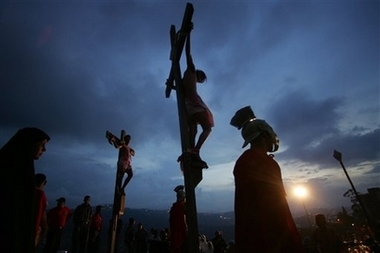 The weekend had begun on the worst possible note with an extreme display of injustice and inhumaneness driven by a religio-political agenda that seemed to relentlessly assert its way forward unchecked. Speak about being at the mercy of the system. Is there really no one who will listen to the desperate cry of injustice? Jesus, the Son of God, was executed. As a mad woman being occupied with seven devils (Lk.8:2) she had no future, she had no life. It was Jesus who had made all the difference. He had provided a life unparalleled to anything she had ever known. Following Him and serving with the others (Lk.8:3) must’ve became her full-time occupation, no doubt an absolute privilege in gratitude for a transformed existence. The hopes and dreams that were generated from His intervention, His presence and teaching, all seemed to have evaporated by Friday evening. He was dead and with Him everything that had meant life and purpose was stripped away. Mary was her name, hailing from Magdala way up north near Galilee. It was early, before sunrise that Sunday as she made her way in the dark to where He had been buried, probably intending to attend to his body for the last time. To her alarm she discovers the stone rolled away and the tomb empty. In a panic she hurries to tell Peter and John, "They have taken the Lord out of the tomb, and we do not know where they have laid him" (Jhn.20:2). Their mission to the tomb soon ends after discovering Mary’s testimony to be true; the tomb is open, the grave-cloths are left but the body is gone. What a perplexing conundrum. Who would want to remove a body and leave the only objects of value, the grave cloths? (Lk.24:12). John the apostle writes, “… as yet they did not understand the Scripture, that he must rise from the dead. Then the disciples went back to their homes” (20:9-10). For Mary that was not enough, she would not simply abandon her search. Instead, despite being overcome by grief she persistently enquired as to His whereabouts. Finding men dressed in brilliant white gowns she says, “They have taken away my Lord, and I do not know where they have laid him” (Jhn.20:13). And then to one she thought was the gardener she expressed for the third time; “Sir, if you have carried him away, tell me where you have laid him, and I will take him away” (Jhn.20:15). And then, He called her name, "Mary" (Jhn.20:16).One can only imagine how the darkness from within her perspective at that very moment must’ve been instantly dispelled by the true Light that had come into the world. The glorious resurrected conqueror of sin, death and hell, stood before her. What an encounter, Divine Holy God and desperate sin sick humanity, face to face.
He called her name! I find it absolutely intriguing that Mary of all people should be the first human eye-witness to Jesus’ resurrection (Mk.16:9). After considering the extreme marginalised position of women in the Jewish socio-cultural context, it is rather striking that she should be considered to be a reliable witness to a supernatural event of such gargantuan proportion as the resurrection. This matter surely endorses the case for the resurrection even further, not that there is any doubt concerning its authenticity. One would normally choose to use the most culturally accepted witness in support of any testimony or claim made. However, it is worthwhile noting that the Lord certainly does not need man’s testimony (Jhn.5:34-36) about Him but graciously allows His followers the privilege to be bearers of good news (Jhn.20:17). The Lord, the Creator of the universe is not bound by man-made social, cultural or religious structures. Rather, how refreshing to perceive as the reader the existence of elements of the faith that would be extremely counter-cultural by nature. He called her name! The risen Lord of Glory meets with Mary, He who sustains all the universe bothers with a woman in a moment of compassion, comfort and commission. Yes, this is the Lord of Glory. Yes this is He, “who, though he was in the form of God, did not count equality with God a thing to be grasped, but made himself nothing, taking the form of a servant, being born in the likeness of men. And being found in human form, he humbled himself by becoming obedient to the point of death, even death on a cross” (Php.2:6-8). Yes, this is He who, “… chose what is foolish in the world to shame the wise; … chose what is weak in the world to shame the strong; … chose what is low and despised in the world, even things that are not, to bring to nothing things that are, so that no human being might boast in the presence of God” (1 Cor.1:27-29). In His infinite wisdom God He has planned and executed the one thing necessary to secure salvation for sinners, Christ’s death and His most glorious resurrection. As we examine the evidence we cannot abandon to go home and forget, but to search in earnest until we are found by Him, until He calls our name. “He has risen, He has risen indeed. And He has called my Name.”
1 Comment
Reflections on Matthew 27:45-51 “Now from the sixth hour until the ninth hour there was darkness over all the land” (Matt.27:45). How eerie it must have been when darkness covered the day as the Creator of the world was secured to the cross. The prophets affirm that darkness combined with other phenomenon depict the dreadfulness of judgment awaiting sin-sick mankind. Amos stated, “Will not the day of the Lord be darkness, not light – pitch-dark, without a ray of brightness?” (5:20). Starting at high noon, darkness prevailed for three hours, no doubt a picture of God’s fierce anger or wrath being poured out on the sin bearing sacrifice, Jesus Christ. This speaks of atonement - the perfect Saviour receiving the judgement for the sin of humanity. But not only darkness sets the scene. Suddenly, this peculiar set of events was interrupted by an anguished cry from the cross. Matthew records for us; “And about the ninth hour Jesus cried out in a loud voice, saying, ‘Eli, Eli, lama sabachthani?’ that is, ‘My God, My God, why have you forsaken me?’”(27:46). The image of desperation, desertion and suffering is first given graphic literary expression when the Psalmist penned; “My God, my God, why have you forsaken me? Why are you so far from saving me, from the words of my groaning? O my God, I cry by day, but you do not answer, and by night, but I find no rest … I am poured out like water, and all my bones are out of joint; my heart is like wax; it is melted within my breast; my strength is dried up like a potsherd, and my tongue sticks to my jaws; you lay me in the dust of death. For dogs encompass me; a company of evildoers encircles me; they have pierced my hands and feet. I can count all my bones - they stare and gloat over me; they divide my garments among them, and for my clothing they cast lots” (Psm.22:1-2; 14-18). This speaks of substitution - Jesus experiencing God-desertion for the sin of humanity.
However, one thing we can be sure of. While these events speak of the severity of God’s judgement they equally express the love of God, the grace of God and His divine provision. How can that be, you may ask? In a moment of such despair how can we see love and grace? Mankind’s desperation, his utterly corrupt sinful existence, without any ability to change his state is vicariously provided for through Jesus’ substitutionary death on the cross. “For God so loved the world that he gave his only Son…” (John 3:16). Christ’s atonement and substitution ensure the salvation of all of those who believe in him.
Following the loud cry of desolation Jesus expresses yet another cry, a loud cry of committal; “Father, into your hands I commit My Spirit” (Lk.23:46). Jesus had openly declared; “No one takes it [my life] from me, but I lay it down of my own accord. I have authority to lay it down, and I have authority to take it up again. This charge I have received from my Father” (Jhn.10:18). The plan of God in providing atonement through the Son is being carried out even to Jesus’ final breath, for as Isaiah prophesied; “… it was the Lord’s will to crush Him and cause Him to suffer” (Isa.53:10). This speaks of absolute will and purpose - everything was progressing as the Sovereign Lord had intended. “At that moment the curtain of the temple was torn in two from top to bottom” (Matt.27:51a). The barrier between mankind and a Holy God is removed, in Jesus Christ, as the curtain rips open. Christ’s sacrifice is acceptable to the demands of a Holy God rendering that which prevented access into His presence obsolete. The way is open through Christ, come in. This speaks of satisfaction – through Christ alone can sin-sick humanity receive forgiveness and know God. Mankind is universally corrupt through sin and incapable of rectifying that state of being. Someone from outside, the God-Man, Jesus Christ substitutes Himself as a perfect sacrifice without sin and experiences the punishment due humanity. Through this sacrificial life and death alone can humanity receive forgiveness, experience God’s love & grace and know God’s eternity plan for salvation. “God made Him who had no sin to be sin for us, so that in Him we might become the righteousness of God” (2 Cor.5:21). The cross has spoken. How will you answer? Jesus, the Great sin bearer, arrives in David’s city seated on a load bearing animal. This was no matter of chance or fluke but as was written in Isaiah (50:7), so also the gospel writer states: “Now it came to pass, when the time had come for Him to be received up, that He steadfastly set His face to go to Jerusalem”(Lk.9:51). Matthew also records, “This took place to fulfil what was spoken through the prophet: ‘Say to the Daughter of Zion, “See, your king comes to you, gentle and riding on a donkey, on a colt, the foal of a donkey” (Matt.21:4-5; Zech.9:9-10). Here we see absolute intention, here we see clear purpose. However, let us pause for a moment and consider who it is that approaches Jerusalem in such a humble manner. It is the Eternal One, the Creator of the entire universe, the One about whom the Psalmist asks; “Who is like the LORD our God, the One who sits enthroned on high, who stoops down to look on the heavens and the earth?” (Psm.113:5-6); the One in whose presence all should tremble (Psm.114:7); the One who is able to deliver (Psm.116:3-7); the One who deserves all the praise and the glory (Psm.115:1). This is non-other than the Lord of Glory. Yes, the main character in this narrative is the God of the universe come down to mankind, the incarnate Son of God. What a comfort to know that everything is in place that nothing has been simply left to ‘chance’. Everything in this drama is playing out according to God’s perfect timing - every detail is under His Sovereign control. It is not a case of being left to the intentions and devices of the authorities or to be at the mercy of a whimsical mob. As the reader we should not consider all the players and anxiously conclude that ‘anything could happen’. Absolutely not. This was all God’s set purpose. Luke writes, “this Jesus, delivered up according to the definite plan and foreknowledge of God, you crucified and killed by the hands of lawless men” (Acts 2:23). The political authorities, religious leaders and the crowds were all under divine supervision as Scripture was being fulfilled with every advance of the drama developing. “For those who live in Jerusalem and their rulers, because they did not recognize him nor understand the utterances of the prophets, which are read every Sabbath, fulfilled them by condemning him. And though they found in him no guilt worthy of death, they asked Pilate to have him executed. And when they had carried out all that was written of him, they took him down from the tree and laid him in a tomb” (Acts 13:27-29).
John records that even for the disciples they did not comprehend the significance of the events unfolding before them, nor their unwitting participation in them. We read, “At first his disciples did not understand all this. Only after Jesus was glorified did they realize that these things had been written about him and that they had done these things to him” (Jhn.12:16).
As we look back on this significant event, and as we once again journey through the stories we know so well this Easter, let us never fall into the trap of forgetting that this was the climax of God’s work on display. As gloomy as things may seem, and as fickle as man can be, our God is never caught off guard and has orchestrated all things according to his sovereign purpose. The Sovereign Lord, set on the stage of the universe, was working out His definite plan that would bring glory and honour to God and result in His salvation for sin depraved humanity. Most often prayers are primarily directed towards personal needs, be they physical or emotional health, material improvement or simply appeals for better all-round circumstances. In contrast, Paul under divine inspiration reveals a prayer charged with appeal for spiritual maturity (Phil.1.9-11). No doubt, for pedagogical reasons Paul discloses the content of his prayer to its beneficiaries. He is not just spelling out a prayer ‘for your information’ but by disclosing its intimate contents he is challenging the prayer content of those who read it, drawing attention to that which is critically important for the well-being and effectiveness of the church, namely; spiritual maturity. Consider Paul’s prayer for a moment; “it is my prayer that your love may abound more and more, with knowledge and all discernment,” (Phil.1:9). As Paul prays for their spiritual maturity he uses the expression, “your love may abound”. I wondered why Paul chose to use the word ‘love’ in the context of the churches spiritual maturity. Was it that love would automatically reveal something of the spiritual transformation and growth happening in their midst?
So let us consider our love-tutor. God’s Word reveals the origin of this love as divine (1 Jhn.4:7) and its nature as other-centred and sacrificial.
“By this we know love, that he laid down his life for us, and we ought to lay down our lives for the brothers. But if anyone has the world's goods and sees his brother in need, yet closes his heart against him, how does God's love abide in him? Little children, let us not love in word or talk but in deed and in truth” (1 Jhn.3:16-18). The great unveiling of the ultimate expression of love – Jesus Christ. Love is not a feeling or even a series of actions but it is a divine man, Jesus. Of course we see the perfect and ultimate display through his incarnation, humiliation and death as recorded a little later in Paul’s letter, but the love is true and complete because of whose incarnation, humiliation and death. God himself, Christ Jesus. The love we should possess and demonstrate is not just doing good works – many un-spiritual people would then qualify as being spiritually mature. No, the love we possess and display is a love rooted and grown out of Christ himself. “I am confident of this, the he who has begun a good work in you shall bring it to completion at the day of Christ Jesus" (Phil 1:6). It is Christ’s love which has been birthed within the believer and which will be brought to full maturity according to his purposes. But how privileged we are to be included in such a divine work, to cooperate and be a part of the love display. This is Paul’s prayer, that the church would be intentionally active in living out Christ’s love. That is, that this maturing love would provide discernment to make the best decisions; provide the ingredients for a pure & blameless testimony; enable a fruitful righteous lifestyle and result in a God glorifying life. |
Ps. Deon LombardBeing a servant of Jesus makes it a delight to reflect and write about all that God has revealed about Himself in His Word. Archives
April 2021
Categories
All
|
We look forward to seeing you!
Banking Details
FNB Walmer Park | Acc No: 53415110906 | Branch: 210317 |









 RSS Feed
RSS Feed
